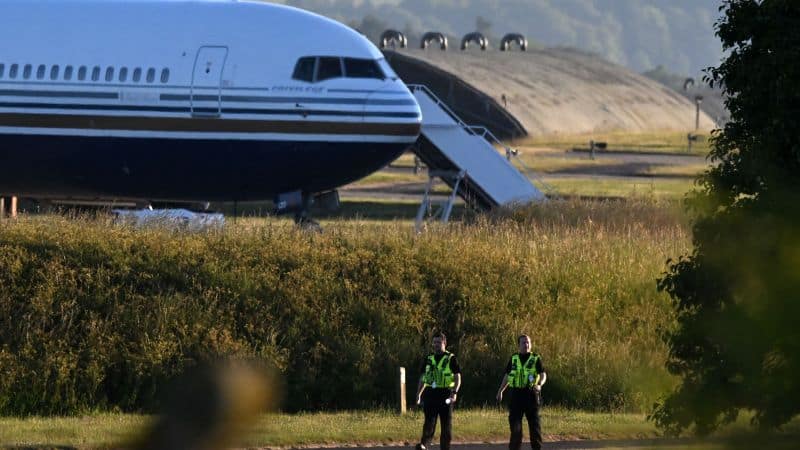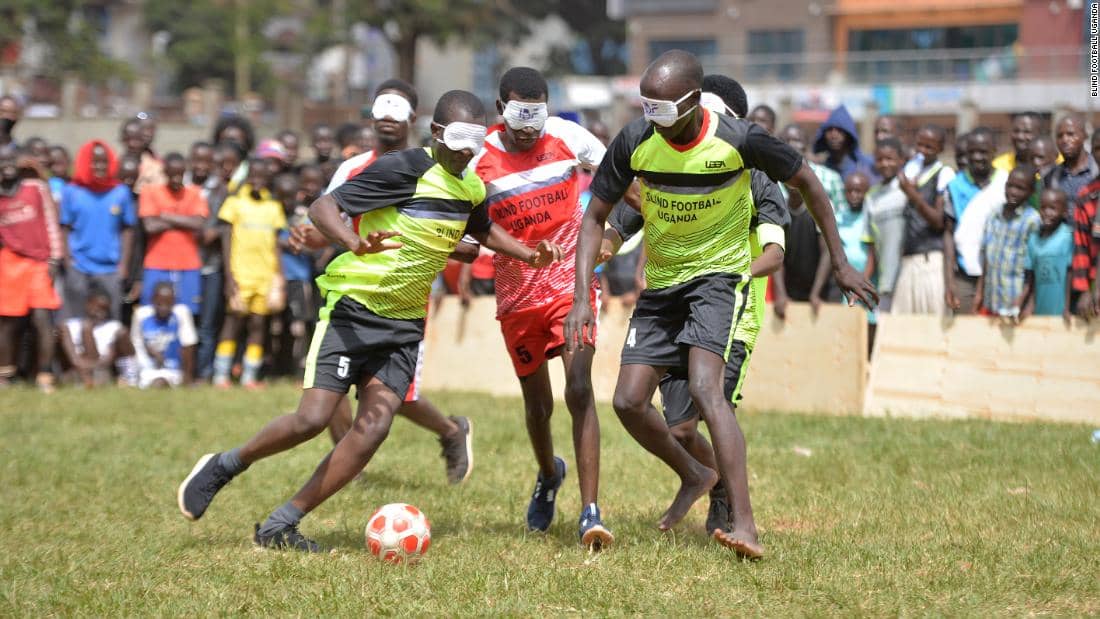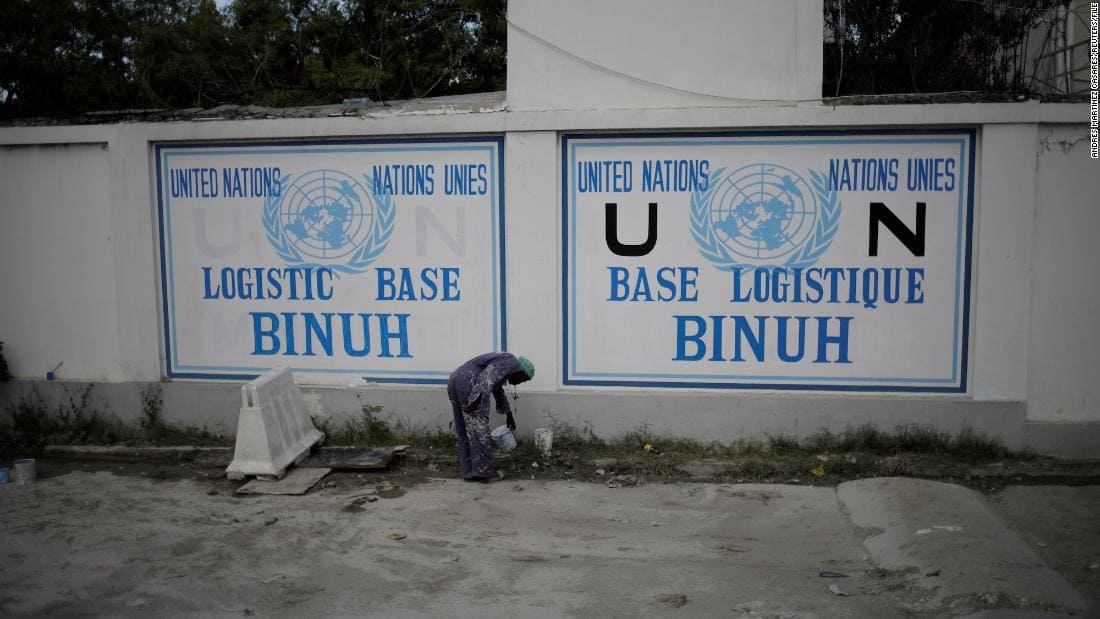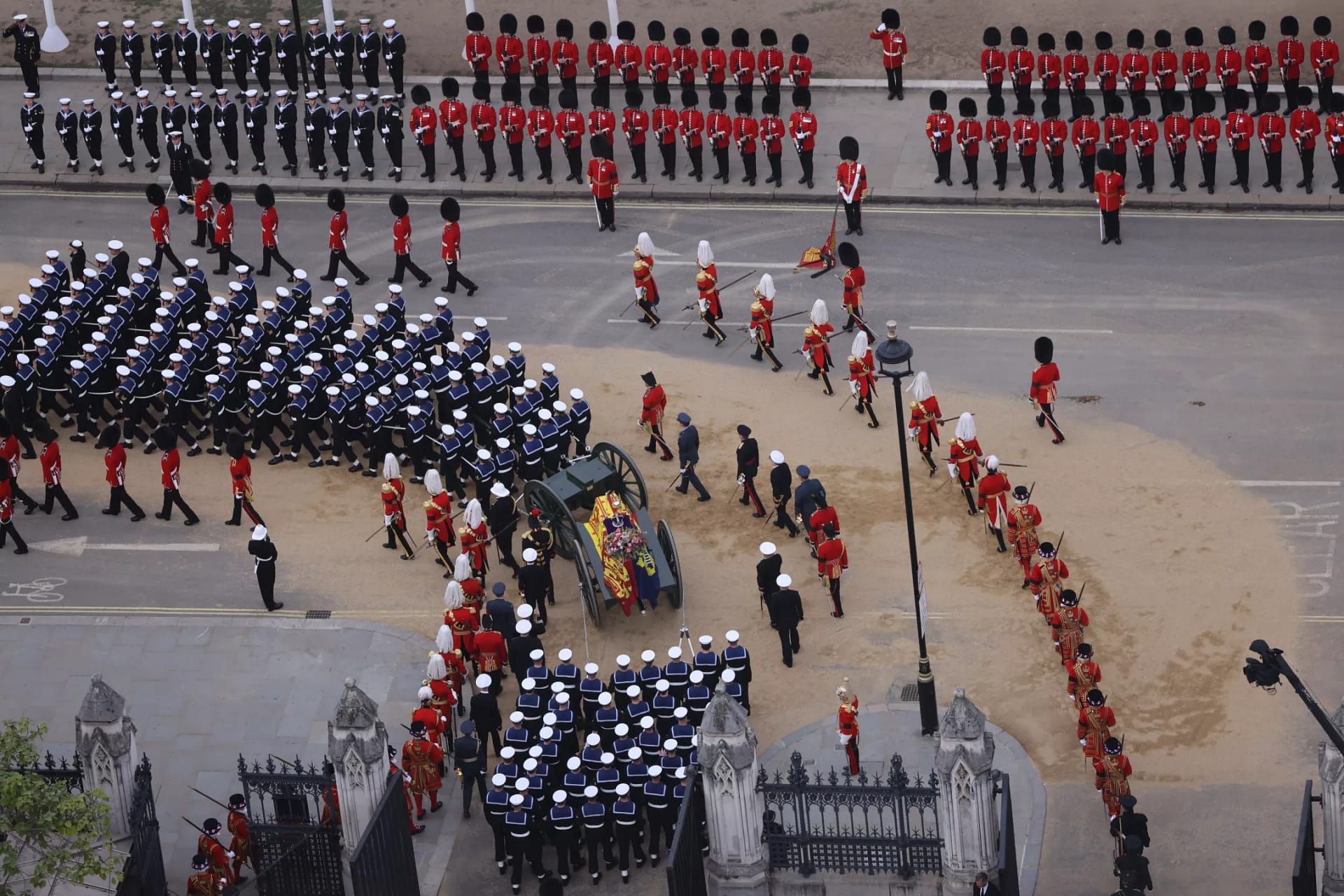London CNN — The UK’s controversial policy to deport some asylum seekers to Rwanda was deemed lawful by the country’s High Court on Monday. A group of NGOs, asylum seekers and a civil
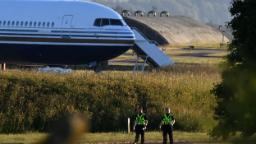
London
CNN
—
The UK’s controversial policy to deport some asylum seekers to Rwanda was deemed lawful by the country’s High Court on Monday.
A group of NGOs, asylum seekers and a civil service trade union had questioned the legality of the scheme, which would see asylum seekers deemed to have entered the UK illegally sent to Rwanda to have their asylum claims processed.
The court deemed the government is able to make those arrangements. But it also criticized Home Secretary Suella Braverman for failing to properly assess the circumstances surrounding individual people set to be moved under the scheme.
Braverman “must decide if there is anything about each person’s particular circumstances which means that his asylum claim should be determined in the United Kingdom or whether there are other reasons why he should not be relocated to Rwanda,” Lord Justice Lewis said in his ruling.
She “has not properly considered the circumstances of the eight individual claimants whose cases we have considered,” the judge continued. Those eight cases will be sent back to the Home Office for Braverman to reassess, he said.
The UK government’s partnership with the East African country has been the subject of fierce criticism since it was announced by former UK Home Secretary Priti Patel in April.
It has been backed by ex-Prime Minister Boris Johnson, his successor Liz Truss and current leader Rishi Sunak, along with most of the ruling Conservative party.
But it has a host of critics, including dozens of refugee rights groups, international agencies, British lawmakers on both sides of the House of Commons, the head of the Anglican church and some Rwandan opposition politicians.
The first flight to Rwanda was set to take off on June 14, but the European Court of Human Rights stepped in at the eleventh hour, and months of legal challenges have stalled the program in the months since.
The UK says it will pay Rwanda £120 million ($145 million) over the next five years to finance the scheme.
Braverman welcomed the Monday verdict, saying in a statement that she is “committed to making this partnership work.
“My focus remains on moving ahead with the policy as soon as possible and we stand ready to defend against any further legal challenge,” she said.
But the ruling was met with disappointment from campaigners, who have long contended that the plan is unethical and ineffective.
“We are very disappointed in the outcome of this case. If the Government moves ahead with these harmful plans, it would damage the UK’s reputation as a country that values human rights and undermine our commitment to provide safety to those fleeing conflict and oppression, as enshrined in the 1951 Refugee Convention,” Enver Solomon, chief executive of the Refugee Council, said in a statement.
“Treating people who are in search of safety like human cargo and shipping them off to another country is a cruel policy that will cause great human suffering,” Solomon added. “The scheme is wrong in principle and unworkable in practice.”
The number of people making dangerous journeys across the English Channel in small boats has spiked in recent years, with 2022 once again seeing record highs despite the government insisting that the Rwanda policy would work as a deterrent.
It remains to be seen whether the policy will now operate effectively; the prospect of individual claims on behalf of migrants still threatens to scupper Sunak’s plans to get the policy off the ground.
But the ruling will be welcomed by the government, which has sunk in popularity and lost the faith of most voters on a number of issues, according to opinion polls.
Don't Miss
“Jeopardy!” fans are confused and more than a little miffed after a controversial Final Jeopardy! clue divided contestants in the
Verizon has brought back its unlimited data plan. That’s great if you’re a Verizon customer. But it is terrible news
Mubende, Uganda
CNN
—
Joseph Singiringabo has lost almost everything and everyone he held dear to Ebola. In a few short weeks, the 78-year-old lost his wife, his son, and a newborn granddaughter to the disease.
He is left taking care of three grandchildren under 13 after their mother fled the village to escape the danger of Ebola. His livestock was stolen while he was away in the required 21-day quarantine, leaving him destitute and desperate.
“
I don’t know where they got the virus from because I went and got checked and I left the hospital without any problem with these children of mine,” he said, sitting on a log outside his modest house in Madudu, in Uganda’s central Mubende district.
“The problem I am facing now is getting food. Secondly, I never went to school, but I want these grandchildren to continue and get educated.”
Uganda is grappling with its deadliest Ebola outbreak in more than a decade, first detected in the Mubende district in late September.
The deadly disease has ravaged families, leaving authorities scrambling to control its spread.
The 2012 Ebola outbreak in the Kibaale district in the country’s western region, led to 17 deaths out of 24 confirmed cases but was declared over in less than 3 months.
Officials have launched aggressive contact tracing to track down relatives and friends who handled the bodies of first victims or attended funerals.
Some escaped from quarantine facilities, others traveled as far as the capital Kampala, and a few visited traditional healers and witchdoctors for treatment instead.
“Some of the patients are still hiding and they don’t know that they have Ebola so they’re out there in the community,” public health physician Dr. Jackson Amone told CNN.

He has been involved in every Ebola outbreak in Uganda as well as in Sierra Leone in 2017. “We need to do case investigation, a lot of contact tracing, and community engagement so that those who present with Ebola symptoms are brought for testing before we release them.”
Dr. Amone is leading the teams operating the Ebola Treatment Units in Mubende. The first was set up in a hurry on the edge of the Mubende Regional Referral Hospital.
A larger center operated by the medical non-profit Médecins Sans Frontières (MSF) is expanding with new ICU beds on the other side of town.
Health workers don extensive Personal Protective Equipment (PPE) to enter the red zones where patients are receiving treatment.
In one zone, a health worker cradles a three-month-old baby suspected of having been infected. Her mother and another sibling are undergoing treatment for Ebola and the disease has already claimed the life of her father.
It’s a cruel welcome to the world for the infant who is wrapped in a blanket as steady rain falls on the makeshift treatment center.
It’s a familiar story across this region as Ebola spreads despite the Ugandan government’s best efforts.
“This Ebola is much easier to deal with than either corona(virus) or AIDS. The main problem here is behavior change,” President Yoweri Museveni told the nation in a Tuesday night address, stressing the need to follow the government’s procedures for those who come into contact with the disease.
Ebola can spread from person to person through direct contact with blood or other bodily fluids such as saliva, sweat, semen, or feces, or through contaminated objects like bedding or needles.
“It doesn’t spread through the air like COVID-19 and does not hide for some months before it shows itself like AIDS,” Museveni said in his televised address.
The country had so far recorded 55 deaths from Ebola, 141 confirmed cases and 73 people had recovered, he said.
Health minister Dr. Jane Ruth Aceng Ocero told CNN she expects Uganda to have the outbreak under control by April if communities cooperate with the government.

There are currently two licensed Ebola vaccines, according to the World Health Organization, but they were developed to be safe and protective against the Zaire strain of the Ebola virus.
Unlike the previous Zaire ebolavirus, the Sudan strain currently circulating in Uganda has no known effective treatment or approved vaccine. However, the country is about to roll out three trial vaccines that have been certified as safe by the World Health Organization (WHO) working group.
The WHO said the first doses would be shipped to Uganda next week and the country expects to expand the vaccine trials after reviewing results from the initial phase.
They are manufactured by the International Aids Vaccine Iniative (IAVI), the Sabin Vaccine Institute USA and a third developed by the University of Oxford and the Jenner Institute UK.
“Our further testing is about efficacy, and how long it protects. We are looking at 3,000 contacts of confirmed cases so we’ll be doing ring vaccination,” Aceng Ocero said, referring to a vaccine process that administers vaccines only to people in close contact with infected patients.
“If we have a confirmed case, then the contacts are the ones who are given the vaccine and they are followed up for 29 days because we want to see if they can quickly generate antibodies and can protect themselves from getting into full-blown disease,” Aceng Ocero added.
Public health officials believe that cases are stabilizing due to increased vigilance, but tradition and religion are holding back progress. One community in Kassanda district, central Uganda, exhumed a body that had been buried safely by health workers to perform religious rites.
It led to “an explosion of over 41 cases within 5 days and 10 deaths,” President Museveni said in his address. He has now barred traditional healers and witchdoctors from taking clients during the Ebola outbreak.
Infections are also rising as it is hard to keep people apart in close-knit communal settings. Robert Twinamasiko, a 30-year-old driver is undergoing treatment after he helped an infected friend to an ambulance. The friend and one other person involved both died.

Twinamasiko has spent 17 days in hospital but says he has no regrets. Although he looked frail, he was making a recovery and told CNN he was looking forward to going home.
“I’m just waiting for my blood work to be discharged but the world out there should know that Ebola is real,” he said from inside a red zone.
Uganda is also trying to contain the spread of the disease by closing the school term early to avoid an outbreak of Ebola in schools which could be hard to manage. “If you have one learner in a class testing positive, the entire class has to undergo quarantine. But also, you will not be 100% sure that that learner did not have contact with other learners outside that class,” Minister Aceng Ocero explained.
She said she was frustrated that Uganda wasn’t getting enough credit internationally for managing the Ebola crisis. “We have experience. This is our eighth Ebola outbreak. Every time we get an outbreak, our experience increases,” she said.
Some global health experts have criticized Uganda’s initial response to the outbreak as slow and inept. Some partners in the donor and diplomatic community have also bristled about how much information Ugandan authorities are sharing with them.
Don't Miss
This Ugandan community has come together to enjoy a football match between visually impaired players. Jagwe Muzafaru works to make

“Wakanda Forever,” the sequel to “Black Panther,” Marvel Studios’ award-winning $1.3 billion grossing movie, had its African premiere in Nigeria — the first time Marvel has held an African premiere there.
Attending the event in Lagos, on Sunday, November 6, the film’s director, Ryan Coogler, and several leading actors spoke to CNN about the importance of celebrating the film in Africa’s most populous country, and how they hope the continued exploration of different cultures and history will impact global audiences.
The film follows the death in 2020 of Chadwick Boseman, who played King T’Challa — the Black Panther — in the original movie, released in 2018.
With the introduction of new anti-hero Namor, the king of underwater kingdom Talokan, who breaches Wakanda’s defenses while the country is still grieving the loss of T’Challa, “Wakanda Forever” presents another mythical and powerful nation, — this time with roots in Mayan culture.
Coogler, who also co-wrote the script, said that introducing another rich heritage was on the cards when he started developing the idea of the sequel in 2018. “We wanted to ramp it up by making it more culturally specific, more detailed, more personal. And even after Chadwick passed away, we stayed the course. I was speaking with him before he passed and he was excited about the direction that the film was going in,” said Coogler.
“Our diversity is our strength”
The 2018 film was one of the highest grossing films in Africa, with audiences responding favorably to the kingdom of Wakanda, which represented an amalgam of African countries and cultures and an ideology of an Africa many would like to see.
Lupita Nyong’o, the Kenyan-Mexican actress who plays Wakandan spy Nakia, told CNN she hopes global audiences will connect with the diversity showcased in the movie. “There is power in a diverse human experience,” she said. “I think it’s always good to be able to relate to people who do not look like you and to see your humanity in them. Our diversity is our strength as human beings.”
1/12
The African premiere of “Black Panther: Wakanda Forever” was held in Lagos, Nigeria. In attendance were its stars, including Lupita Nyong’o, who plays Wakandan spy Nakia. Nyong’o said she hopes global audiences will connect with the diversity showcased in the movie. Credit: PIUS UTOMI EKPEI/AFP/AFP via Getty Images
Nyong’o and her co-star, Zimbabwean-American actress and writer Danai Gurira, attended the Black Panther premiere in South Africa in 2018, and to them, having more of the cast come to the continent they call home is significant. “There’s always a comfort coming back to the continent. We are very different around Africa, but there’s also a through line there,” said Nyong’o. “There’s just something that feels more familiar, more accessible and I love that.”
The film’s score and soundtrack also celebrates the cultures championed in the movie, featuring a mix of Latin American and African artists such as Grammy-winning Nigerian artist Burna Boy, Ghana’s Amaarae, UK artist Stormzy, whose mother is Ghanaian, and Grammy-nominated Nigerian singer-songwriter Tems, who co-wrote the lead single “Lift me up,” sung by Rihanna. The soundtrack was recorded in Nigeria, Mexico and London.
Gurira, who reprises her role as General Okoye, the leader of the Dora Milaje, Wakanda’s all-female army, said of the premiere: “This feels like massive progress that so many of us are here this time. I’m very excited to be here and I think it is different from being in the US or in the West because the story is so rooted in the continent that the idea of it being celebrated here in a big way is only right.”
Also in attendance were actors Winston Duke, who plays M’baku, leader of the Jabari Tribe, Letitia Wright, who plays tech-whiz Princess Shuri, and Tenoch Huerta as Namor. The premiere was one of the opening films at the African International Film Festival (AFRIFF), which runs until 12 November.
“Black Panther: Wakanda Forever” is released in theaters worldwide on November 11.
Don't Miss
You may have never heard of PFAS, but you likely have these potentially dangerous chemicals inside your body. CNN’s Dr.
“Before the end of this year, we will put the country in electoral mode,” Prime Minister Ariel Henry told the
CNN
—
Many sounds reverberate around the Kampala field where a large crowd has gathered to watch a football match: the hubbub of a PA system as the players warm up, the muffled murmurs of hundreds of intertwined conversations, and – once the match has begun – the sound of the ball loudly crackling over the grass, allowing players to locate it.
All the players are visually impaired and reliant on unraveling all these sounds from one another to navigate their way around the pitch, so the crowd falls quiet during the match under the direction of some stewards.
The match is the brainchild of Blind Football Uganda, an organization founded last year by disability inclusion advocate Jagwe Muzafaru to promote and develop the sport within the country.
Blind football is an adapted form of five-a-side football, played with an audible ball on a pitch surrounded by “kick-boards” – a physical barrier indicating the touch lines – and without the offside rule.
“It began from a simple idea [after] I had seen football being played by people who were visually impaired abroad. And I wondered if we could start it in Uganda,” Muzafaru tells CNN Sport.

Originally, Muzafaru used balls designed for goalball – a throwing game created specifically for visually impaired athletes – that disintegrated when kicked, until June 2021 when the donation of a starter kit by the International Blind Football Foundation allowed him to realize his idea of a visually impaired football team.
Although football is one of the most popular sports in Uganda, it is not traditionally played by visually impaired people who stick to athletics and goalball.
“[Those sports] don’t accommodate very many people,” Muzafaru says. “Not everybody can easily be in athletics … even goalball requires a lot.
“When you look at football, you can train in one day, then you can start playing – and not everyone plays it, some come in just for fun and that’s the most important [thing]. But the major thing was mainly to widen the scope of what people with vision impairments play.”
Just a year after its formation, Blind Football Uganda now consists of four men’s teams and two women’s teams, containing mixed abilities and classifications.
Visually impaired athletes belong to one of three classifications – B1 for those who are totally blind, B2 for those who have some sight and can see shadows, and B3 for those who have less than 10% functional vision.
“Even if they’re not totally blind, we include them in our activities, we blindfold them, then we give them that feel to play around,” Muzafaru says.
Under the rules stipulated by the International Blind Sports Federation (IBSA) – the sport’s governing body – only B1 players can compete in blind football, though the goalkeeper must be sighted or partially sighted and is contained within a restricted area.

IBSA relaxed its requirements for women’s football in January 2020, allowing all three classifications to play together, and Blind Football Uganda is following this template in case B2 and B3 players are also later included in men’s international competitions.
For now, the organization is arranging domestic rather than international competition in the form of a league that will coincide with World Cane Day on October 14 and 15.
Disability sports operate under a web of international structures. As well as IBSA, there are non-profit organizations, such as Para Football, which oversee all forms of Paralympic football, which in turn are governed by their own organizations specific to each disability.
“Globally, the international bodies have to accept that Africa is also part of the world because you can look at … the World Cup for cerebral palsy football … this year. There was no African country that was represented, but they called it the World Cup,” Muzafaru says.
CNN has reached out to the tournament organizers – the International Federation of CP Football (IFCPF) – for comment.
This disconnect between the international structures and grassroots organizations is evident in Blind Football Uganda’s relationship with IBSA.
After building an organization without outside technical knowledge, using only YouTube and the internet for guidance, Muzafaru hopes to share his newfound expertise with the international organizations that promote the sport.
“Everything I’ve been doing, no one from even the international body … has ever even asked us: how are we doing it, how can they come on board and assist us,” he adds.
CNN has also reached out to IBSA for comment.
Despite lacking substantial assistance and with financial constraints currently limiting their ambitions, Muzafaru and his team are finding ways to circumnavigate these challenges by crowdfunding online and improvising some of the equipment required.
“I sit with my team, I tell them, ‘Can we develop something similar to what we saw on TV?’ … So we sit and develop something,” he explains.
“For example, when we look at the ‘[kick] boards,’ we make them out of wood. Then we cover them with some clothing, so that they can’t be harmful whenever somebody knocks on them.”

Some financial challenges, however, are proving more difficult to tackle.
As is the case around the world, rising energy prices are impacting on daily life in Uganda as the price of a liter of petrol has increased from Shs 4,580 ($1.19) in December 2021 to Shs 6,350 ($1.65) in July 2022, according to The Observer, a Ugandan newspaper.
“When you look at the current situation you have in the country, the prices of everything are going up … Last year, you could easily move people, we could fund them and then bring them to trainings … Transporting one person now to a training or to a game, it’s a little bit hard,” Muzafaru says.
Visually impaired people often live with their grandparents in more remote areas after completing school as they are unable to work, he explains, further increasing transport costs.
In this environment, Blind Football Uganda’s programs can alter societal attitudes towards people with disabilities and improve the mental health of the participating athletes, particularly following lockdowns during the Covid-19 pandemic.
“Most of the people who are totally blind, ever since when they went blind, they move from home to school, home to school,” Muzafaru says.
“They don’t have any other activities because even their parents limit them. They think that some things may be riskier for them because of the visual impairment they have. When you talk to their parents, when they … see them play, these things create a social life that they haven’t ever interacted with.”

Sport’s impact on mental health, particularly for people with disabilities, is well documented. In a 2014 study conducted by British Blind Sport, participants named competition, health benefits and social interaction as their primary motivations for playing blind football.
“It helps them from being in a situation such as depression, being lonely, [or] limited when they join or they come and play football,” Muzafaru adds.
Using social media, Muzafaru intends to grow the organization to regions outside of Kampala, providing more opportunities for visually impaired people to play football.
“People have seen what we are doing, and people have been inquisitive and ask, ‘How can a blind person play?’” he says. “So these sites are also helping me to mobilize people, an audience that comes to our events.”
Don't Miss
Nadia Nadim on women’s football in Afghanistan one year on from Taliban takeover Nadia Nadim — the soccer player who
Freestyle football great makes history with ninth world title Norwegian freestyle footballer Erlend Fagerli is one of the most established
This Ugandan community has come together to enjoy a football match between visually impaired players. Jagwe Muzafaru works to make
Their refusal to mourn highlights the complexity of the legacy of the Queen, who despite widespread popularity was also seen as a symbol of oppression in parts of the world where the British Empire once extended.
Kenya, which had been under British rule since 1895, was named an official colony in 1920 and remained that way until it won independence in 1963. Among the worst atrocities under British rule occurred during the Mau Mau uprising, which started in 1952 — the year Queen Elizabeth took the throne.
Africa’s memory of the Queen cannot be separated from that colonial past, professor of communication Farooq Kperogi at Kennesaw State University told CNN.
“The Queen’s legacy started in colonialism and is still wrapped in it. It used to be said that the sun did not set over the British empire. No amount of compassion or sympathy that her death has generated can wipe that away,” he told CNN.
‘Tragic period’
While many African leaders have mourned her passing — including Nigeria’s President Muhammadu Buhari, who described her reign as “unique and wonderful” — other prominent voices in regional politics have not.
“Our interaction with Britain has been one of pain, … death and dispossession, and of the dehumanisation of the African people,” it added.
Others recalled Britain’s role in the Nigerian civil war, where arms were secretly supplied to the government for use against Biafrans who wanted to form a breakaway republic. Between 1 million and 3 million people died in that war. British musician John Lennon returned his MBE, an honorary title, to the Queen in protest over Britain’s role in the war.
Still, many on the continent remember the Queen as a stabilizing force who brought about positive change during her reign.
Ayodele Modupe Obayelu from Nigeria told CNN: “Her reign saw the end of the British Empire and the African countries … became a Republic. She doesn’t really deserve any award or standing ovation for it, but it was a step in the right direction.”
And Ovation magazine publisher Dele Momodu was full of praise, recounting meeting her in 2003 in Abuja while covering her visit to Nigeria. He added that he had fled Nigeria for the UK in 1995, during the dictator Sani Abacha’s regime.
“I told her I was a refugee and now the publisher of a magazine. She told me ‘congratulations,’ and moved on to the other people on the line. I salute her. She worked to the very end and was never tired of working for her country. She did her best for her country and that is a lesson in leadership,” he told CNN.
Momodu believes that the Queen did try to “atone” for the brutality of the British Empire. “She came to Nigeria during our independence and some of the artifacts were returned under her reign. That is why the Commonwealth continues to thrive. I feel very sad that the world has lost a great human being.”
Adekunbi Rowland, also from Nigeria, said: “The Queen’s passing represents the end of an era. As a woman, I’m intrigued by her story. This young woman had an unprecedented accession to the throne, and with much grace and dignity did everything in her power to protect the country and Commonwealth she loved no matter what it took.”
Commonwealth Queen
It was while visiting Kenya in 1952 that she learned that she had become Queen. Her father George passed away while she was there with Prince Phillip and she immediately ascended the throne.
As colonialism later crumbled and gave way to independence and self-rule in what had been British overseas territories, the former colonies became part of a Commonwealth group of nations with the Queen at its head and she worked tirelessly to keep the group together over the years.
She forged strong bonds with African leaders, including Nelson Mandela, whom she visited twice in South Africa, and Kwame Nkrumah, with whom she was famously pictured dancing during her visit to Ghana in 1961.
In June, Prince Charles became the first UK royal to visit Rwanda, where he was representing the Queen at the Commonwealth Heads of Government Meeting.
Following his mother’s death, he now heads the Commonwealth, and will embark on a new relationship with its members, about a third of which are in Africa.
Some are asking whether he will be as effective in building the organization as his mother, and above all, how relevant it still is, given its roots in Empire.
Don't Miss
Papua New Guinea (PNG) Foreign Minister Justin Tkatchenko said he was resigning as minister on Friday amid a controversy over
Sydney CNN — Australia’s men’s cricket team has withdrawn from a series of upcoming matches against Afghanistan in protest over
The funeral of Queen Elizabeth II of Britain, who died Sept. 8 at 96, took place Monday morning in
Tigray’s negotiation team includes TPLF spokesman Getachew Reda, and General Tsadkan Gebretinsae, who are “ready to be deployed without delay,” the statement added.
The Ethiopian government formed a committee in June to negotiate with forces from the Tigray region.
Ethiopian government spokesperson Legesse Tulu was not immediately available for comment.
The TPLF had previously expressed major concerns over the AU’s mediation and demanded the government restore major services such as banking and communication to Tigray before any talks can hold. The federal government, however, insisted there must be no preconditions set before the AU intervenes.
UN Secretary-General Antonio Guterres called on “all parties to seize this opportunity for peace and to take steps to end the violence definitively and opt for dialogue,” Dujarric said.
Don't Miss
Mexico is ready to hit the U.S. where it hurts: Corn. Mexico is one of the top buyers of American



